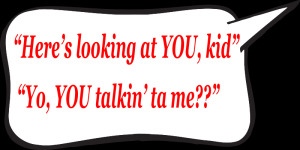 In the last post I discussed the 4 most powerful words, in any language, that research tells us rank highest in power and persuasiveness because they speak to our basic needs and interests as human beings, no matter our culture. They are Mother Nature’s words and added to any headline gives it extra zing.
In the last post I discussed the 4 most powerful words, in any language, that research tells us rank highest in power and persuasiveness because they speak to our basic needs and interests as human beings, no matter our culture. They are Mother Nature’s words and added to any headline gives it extra zing.
Each word is being covered separately, to give it proper due. The word covered last time was FREE; today YOU is the word under scrutiny.
Our favorite word in the world is our name; you hear it in a crowded room and sit up to take notice. You comment fondly when you meet someone else with the same first name. “You” jogs our brain us to look internally to see if the subject applies. Like our name, we simply pay closer attention when we read “you”, “your”.
When 100 of the highest money making headlines of all times were analyzed (thank you, John Caples) for repeat usage, guess which word topped the list? Yep, you guessed it – “you” was listed 31 times, with “your” as #2, earning 14 appearances. This out of only 4 words in double digits of the top 10 words. So no underestimating the importance of personalization and making the reader feel like an individual and not like a head of cattle.
When spoken, “you” can be very generic –there are a lot of potential “you”s out there. “Thank you”, “Pleased to meet you”, or the largely old-fashioned “How do you do?” (with the correct response of “Fine, and you?”, not “Ah, my back is killing me…”) – in all these spoken cases, “you” is not special and not worthy of mention.
But in headlines, “you” is pure magic. It has a special role – it really hopes to mean you, and that you’ll notice yourself in the surrounding words. Hopefully you’ll also take some desired action. Try to use it wherever you can. And the extra bonus is that by using “you” it keeps you focused on whom you are addressing – your important audience. Focusing on the needs and interests of your audience is guaranteed to give you better results, much better than the alternative of focusing on yourself, which too many make the mistake of doing.
The question everyone has when reading anything is: What’s in it for me? The word “you” wants to deliver on that message. A headline is a promise (or should be). “You” is the personal part of WIIFM – “you” screams here’s delivery on that promise and you won’t be sorry!
Next time the topic is: the power of the word HOW – but be careful how you use it, since there is a right way and a wrong way.
Comments? Are YOU sold on the value of the word “you”? Why or why not?
